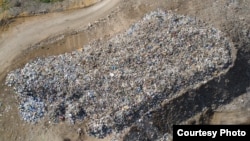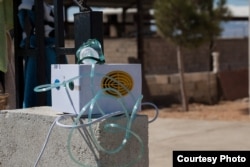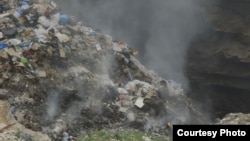An acrid smoke, colored deep ash black, hangs over his village in south Lebanon, and Moussa Hassan Hamede is fed up.
He is fed up that a huge pile of rubbish burns daily outside his house, fed up that his three young daughters are inhaling the potentially carcinogenic air, and fed up no one is doing anything about it.
"The smell of plastic always hangs over this valley, the people here are never comfortable in their homes and the children are always coughing," said the 35-year-old gardener, whose village is located near the city of Tyre.
According to a Human Rights Watch (HRW) report released Friday, when it comes to breathing in noxious fumes Hamede is in good company.
More and more communities across Lebanon are suffering the health impact of burning rubbish, the report claims, despite pledges to improve the country's waste management in the wake of a trash-inspired mass protest that shook the political establishment two years ago.
The threat of cancer
Research by the Ministry of Environment and the United Nations Development Program released in June 2017 revealed there are 941 open dumps across Lebanon.
Of these dumps, more than 150 are regularly set ablaze, sometimes spewing their smoke over communities like Hamede's.
Human Rights Watch's report references dozens of testimonies from Lebanese who say living near burning trash has left them with ailments ranging from skin to respiratory problems.
"I took my children to the doctor as they had ear and throat problems and he said it was likely because of the trash," said Hamede, citing the burning of plastic as the main issue.
"Their throats were scratched from the inside."
Among the few to have studied the problem is Farouk Merhebi, a professor specializing in environmental health at the American University of Beirut.
Merhebi is troubled by the long-term health implications for those forced to live in such conditions.
"The waste contains lots of plastic, which release lots of dioxins that are very carcinogenic," he explained. "The effect of these carcinogens is not immediate, but the probabilities of cancer increase."
Hidden away
The issue of the Lebanese state's chronic mismanagement of rubbish erupted into public consciousness when trash piled on the streets in summer 2015, prompting the 'You Stink' movement which drew tens of thousands onto the streets of the capital demanding change.
The crisis, sparked by the closure of an overloaded landfill south of the city, was symptomatic of a politically manipulated and corruption-riddled system that had failed to move beyond piecemeal approaches to waste and implement a long-term, sustainable strategy.
According to HRW's report, from the start of the trash crisis Lebanon's fire department responded to 3,612 reports of open burning of waste in Beirut and the surrounding region, and 814 in the rest of the country.
However, these failures long proceed the protest, and the impact of unregulated waste dumps and burning of waste have been felt in communities beyond the capital for decades.
Starved of funds from the central government, many municipalities have resorted, and continue to resort, to the cheapest option when it comes to rubbish — piling it up anywhere they can and burning it.
"This is a silent crisis that has been going on for decades that no one has been paying attention to," said Bassam Khawaja, HRW's Lebanon researcher.
Though burning rubbish in Beirut is now a rarer sight, it is the poorest and those beyond the capital who are suffering the most, according to Khawaja.
"The government is shielding the wealthiest parts of the country while the rest suffer."
No sign of improving
If anything, the problem has increased in recent years — according to the Ministry of Environment's own reports, there were 271 more dump sites in 2017 compared to 2011.
As with other issues, the estimated 1.5 million Syrian refugees in Lebanon have found themselves a target for blame.
But though their presence has undoubtedly piled pressure onto already creaky infrastructure, the responsibility is the government's, insisted Khawaja.
The report cites European Union assistance of $89 million in waste management between 2004-2019, funds that have, according to Khawaja, led to a few improvements in a few municipalities.
But these funds, and the occasional response by the state — such as letters sent out by the ministry of health warning municipalities against burning rubbish — do not redeem an overall picture of dysfunction.
"There are no broad-scale policy changes put in place, no central government plan," Khawaja added.
Though the Ministry of Environment declined to comment for this story, previously a senior figure at the ministry complained to VOA that the government did not listen to its proposals.
Such dysfunction may once again spill out onto the streets of Beirut. Two controversial waste sites that were opened in response to the crisis are due to close by the end of 2018, after which there is little clarity about what comes next.
Meanwhile, Hamede and his family will continue to endure the smoke, and hope that their coughs do not evolve into something worse.
The rubbish has been burned for twelve years; it is all his children, aged 6, 8 and 9, have known.
A petition signed by Hamede and 90 other villagers and handed to the municipality has been ignored, and Hamede has little expectation that things will change.
"People with enough money can move. I don't have that luxury," he said.






